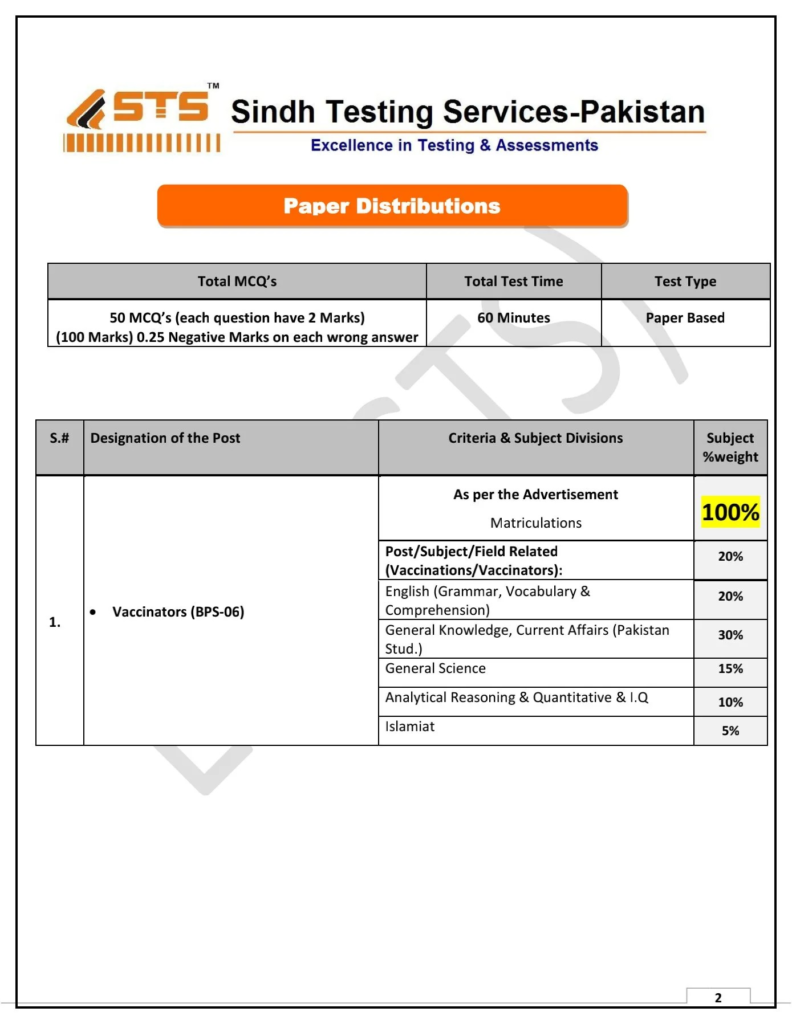Test Paper Pattern for EPI Vaccinators
Overview of EPI Vaccinator Test Pattern
The Sindh Testing Services-Pakistan (STS) exam for the Vaccinators (BPS-06) position is designed to evaluate candidates’ knowledge and skills across various subjects. This comprehensive guide will break down the test format, subject weight distribution, and preparation strategies to help candidates excel.
Test Format
- Total MCQs: 50
- Marks per Question: 2
- Total Marks: 100
- Negative Marking: 0.25 marks deducted for each wrong answer
- Total Test Time: 60 minutes
- Test Type: Paper-based
Subject Weight Distribution
- Matriculation/Post/Subject/Field Related: 100%
- English (Grammar, Vocabulary & Comprehension): 20%
- General Knowledge, Current Affairs (Pakistan Studies): 30%
- General Science: 15%
- Analytical Reasoning & Quantitative & I.Q: 10%
- Islamiat: 5%
Detailed Breakdown
English (Grammar, Vocabulary & Comprehension)
- Focus: Grammar rules, vocabulary building, and comprehension skills.
- Weight: 20% of the test
- MCQs: 10 (20 marks)
General Knowledge, Current Affairs (Pakistan Studies)
- Focus: Pakistan’s history, geography, politics, and current events.
- Weight: 30% of the test
- MCQs: 15 (30 marks)
General Science
- Focus: Basic principles and concepts in science up to matriculation level.
- Weight: 15% of the test
- MCQs: 7-8 (15 marks)
Analytical Reasoning & Quantitative & I.Q
- Focus: Logical reasoning, quantitative aptitude, and intelligence quotient.
- Weight: 10% of the test
- MCQs: 5 (10 marks)
Islamiat
- Focus: Basic knowledge about Islamic studies and principles.
- Weight: 5% of the test
- MCQs: 2-3 (5 marks)
Strategy for Preparation
English:
- Grammar: Practice grammar exercises to understand basic and advanced rules.
- Vocabulary: Expand your vocabulary by reading widely and using flashcards.
- Comprehension: Improve reading comprehension by practicing with passages and related questions.
General Knowledge and Current Affairs:
- Current Affairs: Regularly read newspapers and follow reliable news sources.
- Pakistan Studies: Review textbooks covering Pakistan’s history, geography, and politics.
General Science:
- Basic Concepts: Study fundamental concepts in biology, chemistry, and physics.
- Practice: Solve MCQs related to these topics.
Analytical Reasoning & Quantitative & I.Q:
- Reasoning Puzzles: Practice logical reasoning and pattern recognition questions.
- Mathematics: Brush up on arithmetic, algebra, and data interpretation skills.
- I.Q Tests: Familiarize yourself with I.Q test formats by solving online questions.
Islamiat:
- Islamic Studies: Study the basic tenets, history, and significant contributions in Islam.
Test-Taking Tips
Time Management:
- Allocate time to each section based on its weightage.
- Aim to spend approximately 1.2 minutes per question.
Accuracy:
- Be cautious with guessing due to the negative marking.
- Only guess if you can eliminate at least one incorrect option.
Practice:
- Take mock tests to become familiar with the format.
- Improve speed and accuracy by practicing regularly.
Expanded Program on Immunization (EPI) Vaccinators
Role and Responsibilities
EPI Vaccinators are crucial in the public health system, responsible for administering vaccines to prevent infectious diseases. Their roles include:
Vaccine Administration:
- Administer vaccines according to the national immunization schedule.
- Ensure proper handling and storage of vaccines to maintain efficacy.
Community Engagement:
- Educate communities about the importance of vaccinations.
- Address concerns or misconceptions about vaccines.
- Conduct outreach activities to increase vaccination coverage.
Data Management:
- Maintain accurate records of vaccinations.
- Report vaccination data to supervisors and health departments.
- Monitor and follow up on children who missed vaccinations.
Coordination with Health Teams:
- Collaborate with other healthcare providers to organize vaccination campaigns.
- Participate in training sessions to stay updated on vaccination protocols.
- Assist in managing vaccine stock and supplies.
Key Skills and Attributes
- Knowledge of Vaccines: Understanding the types, schedules, and administration techniques of vaccines.
- Communication Skills: Effectively communicating with diverse populations about immunization benefits.
- Attention to Detail: Accurate record-keeping and adherence to protocols.
- Compassion and Patience: Building trust with community members, especially parents and children.
- Problem-Solving Skills: Handling vaccine hesitancy and logistical issues during campaigns.
Importance of EPI Vaccinators
- Public Health Impact: Preventing the spread of infectious diseases and reducing morbidity and mortality rates.
- Herd Immunity: Achieving high vaccination coverage to protect those who cannot be vaccinated.
- Global Health Goals: Contributing to the success of initiatives like polio eradication and measles control.
Challenges Faced by EPI Vaccinators
- Vaccine Hesitancy: Overcoming misconceptions and misinformation.
- Logistical Issues: Ensuring vaccine availability and proper storage, especially in remote areas.
- Resource Constraints: Managing with limited resources and support.
Conclusion
EPI Vaccinators play a vital role in public health by administering vaccines and educating communities. Preparing effectively for the EPI Vaccinator test involves a thorough understanding of the test format and subject areas. Candidates should focus on each section, practice regularly, and develop strategies to manage time and accuracy during the exam. By excelling in this test, candidates can contribute significantly to public health and the fight against infectious diseases




